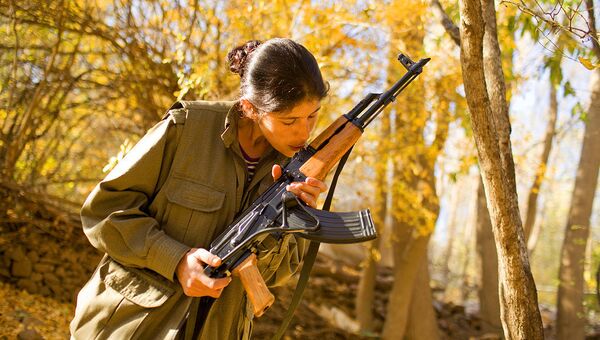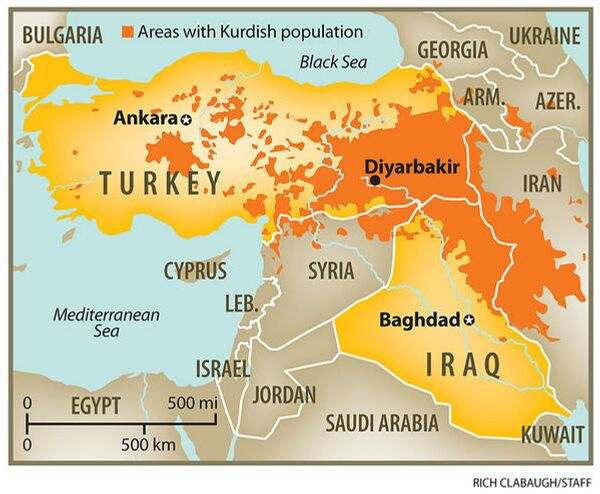For years divided both by national borders and by differing aims, their goal of an independent Kurdistan still looks unlikely.
Now seen as allies of the West in the battle against the Islamic State, some observers are calling the Kurds the ‘key' to stability in the Middle East.
Originally mountain-dwelling people, they number around 50 million. Around half of those inhabit a large portion of south-eastern Turkey, and make up around a quarter of the Turkish population- a significant minority.
In Syria, where they inhabit the Northern provinces, the Kurds have succeeded to some degree in establishing an autonomous region in the shape of Rojava. The Al-Hasakah Governorate in Rojava is the site of many of Syria's oil producing crude oil mines and wells.
Meanwhile the Kurdistan Regional government presides over a large slice of Northern Iraq, including the oil-rich Kirkuk Governorate. And in Iran they are engaged in a separatist struggle currently spearheaded by the Party of Free Life of Kurdistan (PJAK), which has a significant female guerrilla component.
But despite their shared ethnicity, language and heritage, the Kurds themselves are divided, split into various political factions based on differing aims and separated by national borders.
Their organised armed forces, the Peshmerga, meaning "those who face death", have attained an almost legendary reputation as fierce guerrilla style fighters.
Dr. Max Abrahms, political science professor from Northeastern University in the United States believes Kurdish allied support in Syria has become invaluable. The Kurds are essential for the U.S. counterinsurgency in Syria given Washington's poor relationship with Assad and the sad state of the FSA he said.
Key to understanding who the Kurds are is not just to know about their history, but to know something about the dizzying array of acronyms associated with them.
The main Kurdish party in Iraq is the Kurdistan Democratic Party (KDP), headed by Massoud Barzani. Faced by the menace of the IS advance, Kurdish Peshmerga in Iraq have been crucial in defending sites such as the town of Kirkuk, where they successfully repelled an IS onslaught in August.
The KDP leader Barzani has frequently been at odds with the sixty-six year old leader of the Kurdistan Workers Party (PKK), Abdullah Öcalan, imprisoned for life in Turkey on the charge of terrorism since 1999.
The two men have been decades-long rivals for power. In the 1990's, they headed the two sides in the Iraqi Kurdish Civil War, a conflict that brought in Turkey and Iraq on the side of the KDP, and the United States on the side of the PKK.
The PKK is also a designated terrorist organisation that has been involved in a violent struggle with the Turkish state for the last 30 years.
Meanwhile in Syria there is the Democratic Union Party (PYD), affiliated to the PKK.
All of this means that rival Kurdish parties and factions have sometimes been their own worst enemies, their internal but supranational conflicts complicating their wider aim of forming an independent state.
Jawad Mella, head of the Kurdish National Congress in the UK, cannot envision a Kurdish union in the current situation.
Syria, Turkey, Iran, Iraq, every year pay millions of dollars to this party and that party or military group to make divisions between the Kurds, he said.
But, at times, there has been cooperation between different Kurdish groups. When the Syrian Civil War began in 2011, Kurds there focused on establishing a state in the north of Syria.
They were able to do this mainly due to being outside the theatre of violent conflict between the Syrian Regime and the Opposition.
Kurdish demands for their own state stem from before 1918, but the events that took place and the treaties signed then defined their contemporary struggle.
The breakdown of the Ottoman Empire from 1918 onwards saw the boundaries being re-drawn for many of the countries that make up the modern Middle East, but the carving up of the region really took place two years earlier when Britain and France signed the Sykes-Picot agreement.
The Kurds were left out in the cold. Initially promised an independent state by the colonial powers, Kurdish hopes were dashed completely following the signing by Turkey, France and the British Empire of the Treaty of Lausanne in 1923. Lawrence of Arabia once drew a map indicating that he believed Kurdistan should be a separate state.
But as a result of the 1923 Treaty, Kurdistan has never officially existed. In 1923 a short-lived Soviet administrative region for the Kurds was founded in the shape of Red Kurdistan.
"The Kurds helped America and Britain to demolish the regime of Saddam Hussein. We thought at the end of this the American and Western countries would announce a Kurdish state", says Jawad Mella, head of the Kurdish National Congress in the UK. "200,000 people have their own state in Bahrain and some states have less. We are 50 million people, but they've ignored any rights for the Kurds", he points out.
Given the high level of turmoil in the Middle East and the Islamic State's own proclamation that they had ‘broken Sykes-Picot', nation state boundaries are becoming increasingly intangible in the Middle East.
So a Kurdish state doesn't appear viable in the near future. But as many have observed, the Kurds have some of the trappings of statehood, including an organised military.
London based Kurdish activist Mark Campbell says the Kurds have been trying for 20 to 30 years to establish a democracy, somewhat successfully. He says; "They've developed the democratic institutions and systems of the Rojava cantons in Northern Syria. They've also developed — along the same lines — what they call the democratic federation in Northwest Kurdistan". But, he says, "The last 30 years have shown us there is no military solution to the ‘Kurdish Question'."
And, he questions why Turkey continues to see the Kurds as a threat in the face of the far greater menace from Islamic State.
The fate of the Kurds is significant because their territory falls on one of the most oil-rich regions on earth.
Jawad Mella says "We have faced maybe hundreds of genocides, since Islam arrived 1400 years ago. This new attack is because two months ago Mr Barzani declared a referendum in Iraqi Kurdistan to have independence from Iraq. At the same time the Kurdistan government started to sell oil. This has angered our enemies."
One Jerusalem Post commentator said Kurdistan was a "one-state solution for regional stability in the Middle East", in reference to the proposed Israel-Palestine one state solution.
But an independent Kurdistan seems out of the question in the current regional political climate.
As Ibrahim Dogus, Director of the UK based Centre for Turkish Studies says "Maybe in the case of Iraqi Kurdistan, Turkey would be happy to see it independent, because they have good relations with Iraqi Kurdish authorities. But when it comes to Kurds in Iran and Turkey, it will be a different scenario."
In geopolitical strategic terms, Kurdistan has the misfortune to lie on the faultlines on one of the contemporary world's most visible conflicts, and a focal point of crude oil production.
All global powers will take an interest in Kurdistan for that reason, but not for the reason the Kurds want.





